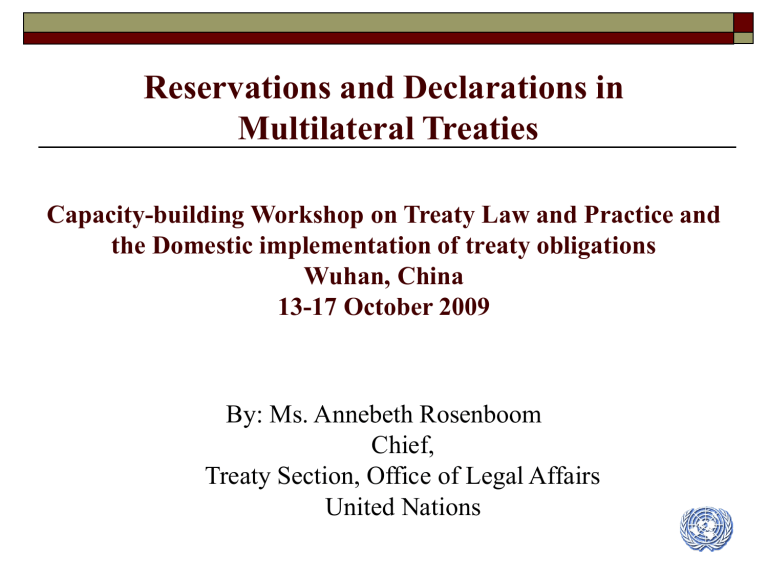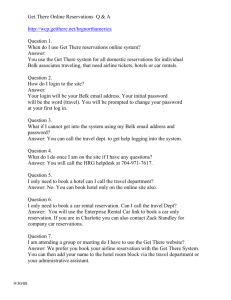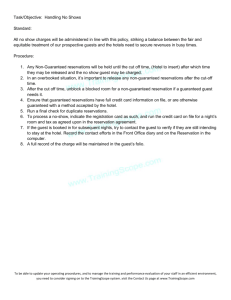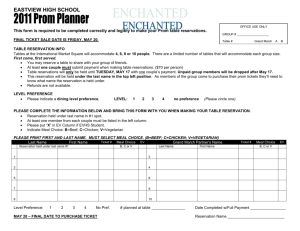
Reservations and Declarations in
Multilateral Treaties
Capacity-building Workshop on Treaty Law and Practice and
the Domestic implementation of treaty obligations
Wuhan, China
13-17 October 2009
By: Ms. Annebeth Rosenboom
Chief,
Treaty Section, Office of Legal Affairs
United Nations
Reservations
Why are reservations important?
What are reservations? How are they different from
declarations?
Who can formulate reservations?
When can reservations be formulated
Form of reservations
The Depositary’s Role
Objections
Late Reservations
Withdrawal and Modification of reservations
Why are reservations important?
Reservations enable a State to participate in a treaty in which
it would not be able to participate due to an unacceptable
provision or provisions.
Multilateral treaties are the result of meticulous negotiations with many concessions and compromises.
In many cases the purpose of the reservation is merely to
adjust the reserving State’s obligations under the treaty to
conform to its domestic law where, for political, cultural or
social reasons, it is not feasible or desirable to change the law.
Many States make reservations.
What are reservations?
Unilateral statements, however phrased or
named, purporting to exclude or modify the legal
effect of certain provisions of a treaty in their
application to the reserving State.
May be entitled “reservation”, “declaration”,
“understanding”, “interpretative declaration” or
“interpretative statement”.
(Article 2(1)(d) of the Vienna Convention 1969)
How are reservations different from
declarations?
The title does not matter – only the effect.
States will at times submit to the depositary
statements called declarations or interpretive
declarations.
If the “Declaration” excludes or modifies the legal
effect of certain provisions of a treaty in their
application to the State in question, it is a
reservation.
We will not change the title, however, in the
depositary notification.
Who can formulate a reservation?
In the UN SG’s practice, only the Head of State or Government
or the MFA (or a person acting in that capacity or having
delegated authority for that purpose issued by one of the above
authorities) can formulate (i.e., sign) a reservation.
A reservation is a limitation on the commitment undertaken by
a State. If a reservation is separate or annexed to an instrument
of ratification or accession, it must be signed by the Head of
State or Government or MFA (or a person acting in that
capacity or having delegated authority for that purpose issued
by one of the above authorities).
The same standard applies to withdrawals and modifications to
reservations.
When can reservations be
formulated?
Upon signature, ratification, acceptance,
approval, accession, etc., unless:
The reservation is prohibited by the treaty;
The treaty provides that only specified
reservations, which do not include the reservation
in question may be made; or
The reservation is incompatible with the object
and purpose of the treaty (VCLT, article 19).
Reservation made on signature
If made upon simple signature it is merely
declaratory.
o
Must be formally confirmed in writing upon ratification,
acceptance, or approval.
If made on definitive signature, it need not be
confirmed later.
(Art. 23(2), Vienna Convention, 1969)
The Depositary’s Role
When reservations are made, the depositary must determine
whether such a reservation should be accepted upon signature
or upon deposit of an instrument.
If a declaration or statement is made, the depositary must
make a prima facie determination as to whether the
declaration or statement is in fact a reservation.
What does the treaty say? Either the treaty is silent as to
reservations, or has provisions relating to reservations.
If the treaty has provisions relating to reservations, the
depositary is guided by the relevant provisions of the treaty
itself.
Reservations Prohibited
Where a treaty expressly prohibits reservations:
The depositary makes a preliminary legal assessment whether
a statement constitutes a reservation.
If it has no bearing on the State’s legal obligations, and is not
therefore a “reservation”, the SG will formally receive the
statement in deposit and circulate it.
The UN SG will not circulate an unauthorised reservation.
Where the SG requests a clarification and the State confirms
the absence of a reservation, the State is estopped from
relying on the statement as a reservation at a later date.
Examples
Some treaties specifically prohibit all
reservations, for example:
•
•
•
Statute of the International Criminal Court;
Many disarmament treaties deposited with the SG
(Comprehensive Nuclear-Test-Ban Treaty, Chemical
Weapons Convention, Anti-Personnel Mines Convention);
Most environmental treaties deposited with the SG
(Montreal Protocol, Kyoto Protocol, Rotterdam
Convention, Stockholm Convention, Cartagena Protocol,
etc.)
Treaty Expressly Authorises
Reservations
Where a State formulates a reservation that is
authorised, the SG circulates the reservation
to the States concerned.
Such reservation does not require any
subsequent acceptance by the States
concerned.
Treaty authorizes only specified
reservations
According to VCLT, article 19(b) – a reservation is
allowed unless the treaty provides that only specified
reservations, which do not include the reservation in
question, may be made.
Many treaties deposited with the SG authorize
reservations with regard to settlement of dispute
procedures and are otherwise silent as to
reservations.
Does this mean that all other reservations are
prohibited?
No – the SG’s practice in this regard is to interpret
the above provision narrowly - will accept other
reservations in deposit.
Treaty is silent on reservations
Where a treaty is silent on reservations and a State formulates a
reservation, the depositary informs the States concerned.
The depositary does not make a judgement in this regard
(whether compatible with object and purpose).
His role is to accept the reservation in deposit, to
communicate it to all States concerned, and leave it to each
State to draw the legal consequences from such reservations.
Unless a State objects within 12 months, it is presumed to
have accepted the reservation.
Who decides whether a reservation is
consistent with the object and purpose?
Whether consistent with the object and purpose:
Given the complexity of today’s treaties, identifying the
object and purpose can be difficult.
Human rights bodies?- Have tried to take over this role.
–
This has been criticized by States.
Depositary?
–
For now, no.
–
The Special Rapporteur of the International Law
Commission, Mr. Pellet, and some States see a role for the
depository.
States Parties?
A debate continues.
The SG will continue with the current practice
unless States agree otherwise.
Objections to Reservations
Only States which are signatories or parties to a treaty
may object to a reservation.
Where a reservation has been circulated, States
concerned have 12 months to object, beginning
on the date of the depositary notification or
on the date on which the State expressed its consent to be
bound by the treaty (See art. 20 (5) VCLT)
An objection lodged after the end of the 12-month
period is circulated by the depositary as a
“communication”.
May be a political decision by States to wait until after
12 months
Effect of Objections
An objection “… does not preclude the entry into force of the treaty ...
unless a contrary intention is definitely expressed by the objecting
State”.
To avoid uncertainty, an objecting State specifies whether its
objection precludes the entry into force.
If a State does not object to a reservation made by another State, it is
deemed to have tacitly accepted the reservation.
An objection need not be signed by one of the recognized authorities.
As with reservations, only concerned States (signatories and parties)
are competent to pass upon the legal effect of an objection. The SG
will circulate “objections” by non-contracting or signatory States as
“communications” since they are of no legal effect.
Examples of Objections-CEDAW
…Austria is of the view that the exclusion of such an
important provision of non-discrimination is not compatible
with object and purpose of the Convention. Austria therefore
objects to this reservation. This position, however, does not
preclude the entry into force in its entirety of the Convention
between Saudi Arabia and Austria.
…The Government of Finland therefore objects to the abovementioned reservations made by the Government of the
Federated States of Micronesia to the Convention. This
objection does not preclude the entry into force of the
Convention between Micronesia and Finland. The
Convention will thus become operative between the two
states without Micronesia benefiting from its reservations.
Late Reservations
Formulating reservations after ratification, acceptance,
approval or accession
The SG circulates such reservations, and accepts them in
deposit only if none of the States concerned object.
The SG’s practice deviates from the strict requirements of
the VCLT.
Practical solution based on the fact that States have an
inherent right to modify treaty relations and such
modification must receive unanimous acceptance.
Alternative would be denunciation. Certain States have
denounced treaties and re-acceded in order to lodge
reservations. This approach has been criticised by other
States. An example is the case of the International Covenant
on Civil and Political Rights.
Time Limit for Objections
to Late Reservations
States have 12 months from the date of the depositary
notification within which to object to a late reservation.
Same where a State withdraws an initial reservation
and substitutes it with a new or modified reservation.
If there is an objection, the proposed late reservation
fails and is not accepted in deposit.
As with timely reservations, an objection lodged after
the end of the 12-month period is circulated by the
depositary as a “communication”.
May be a political decision by States to wait until after 12
months
Withdrawal of Reservations
A State may withdraw its reservation completely or partially at
any time.
The consent of the States concerned is not necessary.
Must be formulated in writing and signed by the Head of
State or Government or MFA (or a person acting in that
capacity or having delegated authority for that purpose
issued by one of the above authorities).
A withdrawal of a reservation becomes operative only when a
concerned State has received notification of the withdrawal by
the reserving State (VCLT, Art. 22(3)).
In practice, notice is provided by a depositary notification and
the date of the depositary notification is deemed the date of
constructive notice.
Withdrawal of Objection
Objections can be withdrawn at any time also.
The withdrawal of an objection becomes
operative only when notice of it has been
received by the reserving State. In practice,
notice is provided by a depositary notification (CN)
and the date of the depositary notification is deemed
the date of constructive notice.
A withdrawal of an objection does not need to
be signed by one of the 3 authorities.
Modifications to Reservations
An existing reservation may be modified so as to
result in a partial withdrawal or to create new
exemptions.
A modification of the latter kind has the nature of a new
reservation.
The SG circulates such modifications and grants the States
concerned 12 months within which to object to them.
Copyright Notice
Copyright 2009 by the United Nations. All
rights reserved. Printed in the United States
of America. No part of this publication may
be reproduced, stored in a retrieval system, or
transmitted in any form by any means, i.e.,
electronic, mechanical, photocopying,
recording, or otherwise, without the written
permission of the United Nations.






